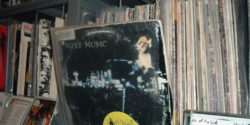College radio history is near and dear to me; so I am thrilled to learn about the WNUR Underground Archive Project. Launched initially as a student project by WNUR (see my 2008 station tour) participant Brock Stuessi, the website features a glimpse into the Northwestern University radio station’s rock music collection. Featuring scans of album covers and handwritten music director-penned reviews, Stuessi started the project by taking a closer look at material from 1980 to 2000.
In his “Rock Show: The Early Days” exhibit, he writes,
The year 1980 marks an important shift in the culture and future of WNUR. From its first broadcast in the basement of Annie May Swift Hall on May 8th, 1950 to 1980, WNUR was a college radio station aimed at emulating more mainstream broadcasting style with an emphasis on newscasting and more popular forms of music.
In 1980, a divide within the station between those who wanted to continue the mainstream tradition and those more interested in the new underground music culture of the early eighties began to form. This split came to a head when, during the summer of 1980, the ‘revolutionaries’ occupied the station and locked themselves in the studio for a period of days. With this act, the rock show, and the rebellious ethos it embodied for the next 37 years had begun. Within two years the station would change its branding to ‘The New Music FM,’ only to change to ‘Chicago’s Sound Experiment’ in 1995.
Stuessi looks at tensions at the station in those early years starting in 1980 and shares his analysis in his exhibit and in an accompanying podcast. Future podcasts will delve into other aspects of WNUR’s music history. I’m happy to see these efforts, especially since the music-specific discussions exemplified in the dialogue on LP album covers hasn’t been adequately documented up to this point. Examples exist here and there, including in KEXP’s “Review Revue” blog series cataloging its collection of KCMU album reviews and in some of the posts on the WPRB History blog.
Do you know of other stations that have archived or posted music reviews from the past? Drop me a line and let me know.
2/22/18 update: Thanks to members of the WNUR alumni community for sharing Michael J. Kramer’s extensive review of Stuessi’s project, which contextualizes it within the larger body of digital history work. Kramer writes, “Here is a sonic and visual and textual door into questions of aesthetics and politics, of the odd relationships between elite institutions such as Northwestern and the underground youth cultures they could sustain without even quite knowing they were doing so; of vexing issues of race, class, gender, and regional identities as presented in sound and iconography and commentary; of patterns of production and consumption in 80s and 90s America.”



